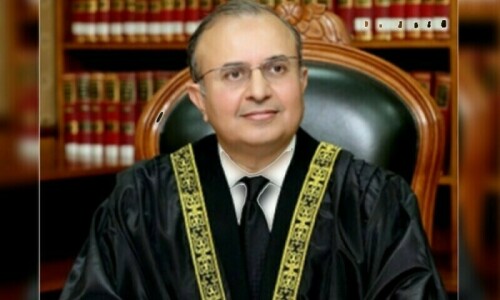
LAHORE: With entire area around the protest having posters and pictures of the missing persons, including Raza Khan, the protestors put up a spirited show for four hours at their protest camp outside the Lahore Press Club on Saturday.
Many new faces who have not normally been part of such protests in the past, were also seen on Saturday, encouraging the organisers to claim that they protest is now spreading to wider social scale.
Quoting the figures of the Commission of Inquiry on Enforced Disappearances, the ogranisers claimed that the pending cases with the commission were now 1,640 and many families did not register cases because of insecurity that such complaints entail.
“Enforced disappearances are now a concrete policy used by the state to generate fear and insecurity, with the objective to silence critical debate in the country. It is thus a critical issue for every citizen and silence over it in Punjab is mind boggling,” says Asim Sajjad Akhter, Punjab president of the Awami Workers Party (AWP) how has been leading protests against enforced disappearances across the country.
“The difference between this protest and the last one is that the people from across the country have gathered here in Lahore, which means the pain of those families, who are losing dear ones to enforced disappearances, is now being felt by more and more people,” he added.
Farooq Tariq, central spokesman for the AWP, said Dr Bakhshal Thalho and Ustad Mir Muhammad Ali Talpur addressed the protest from Sindh while Manzoor Pashteen of Pashtun Tahafuz Movement did that from Khyber Pakhtunkhwa.
“We demand the state make public the report of 2010 Judicial Commission and Criminalise Enforced Disappearances. Either present legal charges against the disappeared in the court of law or let them go back to their families whose lives have been made an agony,” Asim Sajjad said and added: “No threats are grave enough to justify enforced disappearances as a state policy. Our judicial system is robust enough to deal with legitimate threats through the procedural justice. Without recourse to due process of law, forcibly disappeared become political prisoners and prisoners of conscience.”
Published in Dawn, April 1st, 2018













































